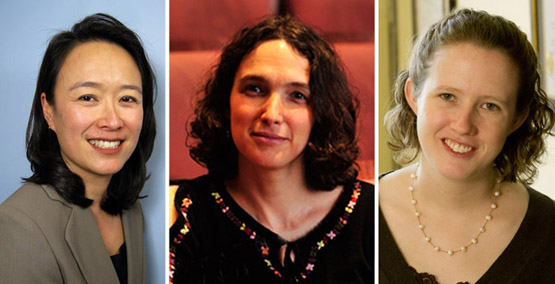Young Faculty Win Major Support
Peter Paul Program awards three professors $50,000 annually for three years

Imagine getting news akin to winning the lottery: three young BU profs each recently scored $50,000 annually for three years to support their research, thanks to the Peter Paul Career Development Professor Program.
“The first thing I did after the initial shock was breathe a sigh of relief,” says Catharine Wang, an assistant professor in the School of Public Health department of community health sciences, who recently joined the University. “One of the most challenging aspects as a junior faculty member is finding ways to get new research ideas off the ground. I plan to use the award to bolster and strengthen an ongoing study and to initiate two pilot studies related to the translation of genomic discoveries into programs that will improve human health.”
Wang is joined by Margaret Litvin, a College of Arts & Sciences assistant professor of Arabic and comparative literature, and Abigail Moncrieff, an associate professor of law at the School of Law. The awards are named for Peter Paul (GSM’71), president of the mortgage banking company Paul Financial, LLC, who gave the University $1.5 million in 2006 to fund 10 professorships over five years. Paul targeted promising faculty who have been at BU no more than two years and have held no prior professorships. Nominations are submitted by deans and department heads and awardees selected by President Robert A. Brown and Provost David Campbell.
“It’s a hugely important program,” says Campbell, “and one that BU is almost uniquely fortunate to have. Career development is something many universities try to do, often with internal funding, but having it at the level of multiple awards per year is really exceptional.”
Litvin, who has been researching Arabic adaptations of Shakespeare over time, says the award feels like “manna from heaven” and will allow her to jump into her next projects without spending time and energy chasing grants. One will follow up with Arab writers and artists who studied in the USSR or Socialist bloc during the Cold War to learn what sort of cultural influences they brought back to their home countries. Another will look at Arab and Arabic-language theater in post-9/11 United States and Europe.
“Since coming to BU in fall 2008, I’ve been consistently impressed with the support and encouragement I’ve received as a new assistant professor,” Litvin says. “To me it speaks of the administration’s commitment to new faculty, which I’ve experienced as wonderful, and also its effort to build and promote our already very strong programs of research and teaching about Muslim societies.”
Moncrieff says the award is “a humbling and motivating recognition of scholarly promise that I am determined to live up to.”
She plans to use the support primarily on “a project that reconceptualizes individual substantive rights under the U.S. constitution and applies that to map a terrain of constitutional rights to health care, many of which we already recognize and some of which we might — and I will argue, should — recognize in the future.”
Campbell says the program is important in that it helps focus deans on incoming professors and celebrates the importance of supporting faculty in their attempts to build research careers.
“The thing I’ve been most impressed with is the quality of the nominations,” he says. “These are really outstanding faculty. The Peter Paul Professorships really support the faculty across the whole University, which is extremely important. The work that’s being done is mind-boggling.”
Caleb Daniloff can be reached at cdanilof@bu.edu.
Comments & Discussion
Boston University moderates comments to facilitate an informed, substantive, civil conversation. Abusive, profane, self-promotional, misleading, incoherent or off-topic comments will be rejected. Moderators are staffed during regular business hours (EST) and can only accept comments written in English. Statistics or facts must include a citation or a link to the citation.